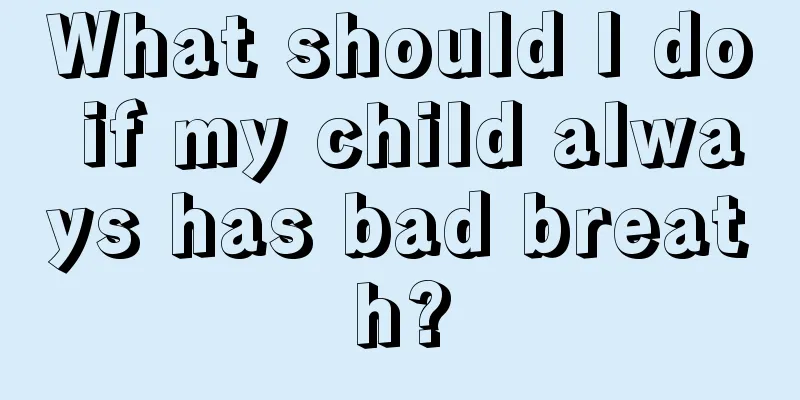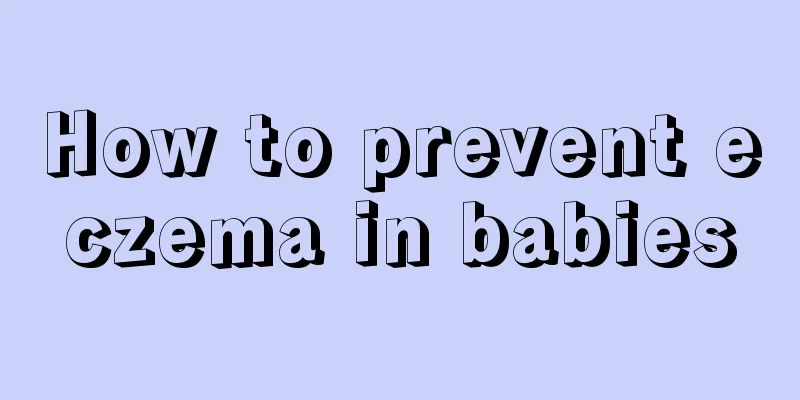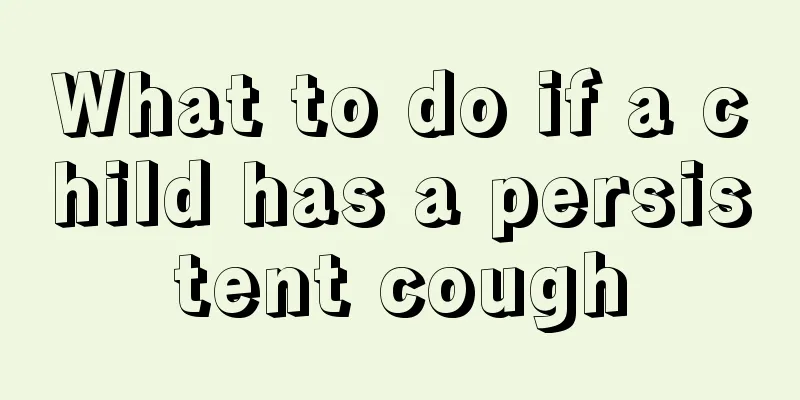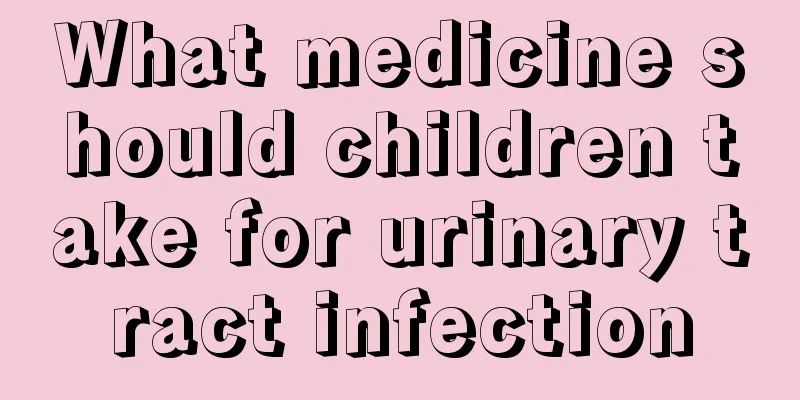What should I do if my child always has bad breath?

|
Some mothers find that their children always have bad breath for some unknown reason. In fact, as adults, we have all experienced bad breath. Generally speaking, bad breath indicates that there is a problem with your stomach or other parts of your body. But for children, what causes bad breath? As a mother, when you encounter bad breath in your child, you must take targeted measures to treat it.
Children's digestive organs are not fully developed, digestive juices are not secreted enough, enzymes are not fully functioning, the stomach and intestinal mucosa are tender, and the digestive function is relatively weak. If parents cannot feed their children properly and give them everything to eat, the quality and quantity of their diet will be inappropriate, damaging their stomach and intestines. The children will then have symptoms of indigestion (food damage), such as bloating, vomiting, loose stools with a sour and smelly smell, and a large amount of undigested food residues. ① Improper feeding causes gastrointestinal dysfunction. ②Gastrointestinal inflammation. Infants and young children eat food contaminated by bacteria, which causes gastrointestinal inflammation. ③ The abuse of antibiotics causes imbalance in the gastrointestinal flora, in which normal bacteria, such as lactobacilli, are inhibited, while miscellaneous bacteria grow and multiply in large numbers. ④When the weather gets colder, the body's resistance is low and a cold stomach can cause indigestion. What to do if your baby has bad breath A. How to treat bad breath in children Children's bad breath can generally be treated with Chinese medicine. Traditional Chinese medicine divides children's bad breath into two categories: damp-heat in the stomach meridian and food accumulation. In the outpatient clinic, we often encounter children with bad breath, but oral examination shows no problems and it is mostly caused by indigestion. Children's bad breath can generally be treated with Chinese medicine. Traditional Chinese medicine divides children's bad breath into two categories: damp-heat in the stomach meridian and food accumulation. Dampness and heat in the stomach meridian The children show symptoms such as red tongue, yellow tongue coating, bad breath, irritability and restless sleep. Many children also have dry stools. You can take some heat-clearing and dampness-drying medicine under the guidance of a Chinese medicine practitioner. Such as 6 grams of Gardenia, 10 grams of Erhua, 6 grams of Perilla frutescens, 6 grams of Patchouli, and 2 grams of Rhubarb for dry stool. When decocting, soak it in water for 20 minutes. After decocting for 15 minutes, pour out the juice and add appropriate amount of sugar before taking. This recipe is for a daily dose for children around 3 years old, and should be taken twice a day, morning and evening.
It is more common in urban children aged 1 to 6 years old and is related to irregular diet and improper feeding. This type of children have long-term loss of appetite, pale face and thinness, but their spirits are normal. The medication is mainly for digestion and stomach. For children around 3 years old, 10 grams each of roasted malt, Shenqu, and charred hawthorn, and 6 grams of Patchouli can be used, and the method of use is the same as above. Chinese patent medicine can be used in conjunction with Baohe Pills, which help digestion and eliminate accumulation. Parents are advised not to let their children eat too many snacks, especially sweets before going to bed. You can eat more fruits and vegetables such as apples, red and white radishes, and hawthorn to increase fiber and vitamins to promote intestinal motility, reduce stool accumulation, and avoid getting angry and bad breath. We should help children develop good hygiene habits, especially those who like to eat snacks. They must rinse their mouths after meals and brush their teeth in the morning and evening. Especially when suffering from acute infectious diseases, they should pay more attention to oral hygiene and clean their mouths in time. They can rinse their mouths with light salt water and drink more cold boiled water to keep the mouth moist and the environment clean, and reduce the occurrence of oral diseases. In this way, children can have "sweet taste in their mouths" and stay away from diseases. B. Western medicine treatment of bad breath in children Under the guidance of a doctor, parents can use 1% hydrogen peroxide, 2% soda water, 2% boric acid water, etc., and choose one of them for gargling to reduce and eliminate bad breath in children. It should be noted that antibiotics should be used rationally to avoid abuse that may induce other diseases and secondary infections.
Traditional Chinese medicine believes that bad breath is caused by excessive stomach fire or the evaporation of dampness and turbidity. In addition to paying attention to oral hygiene, you should also eat foods that have the effects of clearing away heat and dampness, avoiding filth and removing odor. For example, fennel can be drunk as soup or chewed raw, tangerine cakes can be chewed frequently, and black plum preserves can be chewed and dissolved. Recent studies have found that kelp, a seaweed plant, contains highly effective odor-eliminating substances. Its deodorizing effect is three times that of existing bad breath inhibitors, flavonoids. Therefore, people who suffer from bad breath can eliminate bad breath by eating kelp regularly. The following porridge has a certain effect on preventing and treating bad breath: Patchouli Congee Wash 15 grams of Patchouli (30 grams of fresh Patchouli), put it into an aluminum pot (be sure to use an aluminum pot), add water and boil for 5 minutes, discard the residue and take the juice for later use. Then wash 50 grams of japonica rice, add appropriate amount of water into the pot, bring to a boil on high heat, then simmer over low heat. When the porridge is cooked, add patchouli juice, boil again and it is ready to eat. Mint porridge: Wash 30 grams of fresh mint leaves (15 grams of dried mint leaves), put them into a pot, add appropriate amount of water and boil, discard the residue and take the juice for later use. Wash 50 grams of japonica rice, add appropriate amount of water and cook until the rice is cooked, then add mint leaf juice, boil and it is ready to eat. Ophiopogon japonicus porridge Wash 20-30 grams of Ophiopogon japonicus, put it into a pot, add water and boil it, discard the residue and take the juice for later use. Wash 50-100 grams of polished japonica rice and put it into an aluminum pot. Add appropriate amount of water. Then put appropriate amount of Ophiopogon japonicus juice and rock sugar into the pot. Bring to a boil over high heat and then cook over low heat. |
<<: Baby, why does your breath have bad breath?
>>: What causes bad breath in a three-year-old child?
Recommend
How to treat autism in children
It is a comfort for all parents to see their chil...
What are the classifications of cardiovascular and pulmonary diseases?
Children are prone to various disease symptoms, a...
Why does my child's finger hurt?
If a child's fingers hurt, it may be that the...
Characteristics of the Eustachian tube in children
The Eustachian tube, also known as the Eustachian...
Treatment of hip synovitis in children
We all know that every child is lively and emotio...
Dietary considerations for children with nephritic syndrome
Nephritic syndrome in children is generally more ...
Why do children often have knee pain?
Every child is the apple of the family’s eye. Whe...
What are the symptoms of oral ulcers in children?
Children have relatively poor resistance, and the...
How to diagnose and treat abdominal lymph nodes in children
Children's abdominal lymph nodes may be the p...
One and a half year old baby has repeated fever
Very young babies are generally very weak, so par...
What to do if your child has swollen tonsils
If a child has swollen tonsils, parents should of...
What is the reason for the red eyes of a two-year-old baby?
A two-year-old baby is very young and is very wor...
How to treat abdominal lymphadenitis in babies
The health of the baby is the most important thin...
What are the benefits of eating bird’s nest for children?
Many parents usually eat some bird's nests at...
How to determine whether a baby is anemic
We all know that newborn babies are weak, and man...









